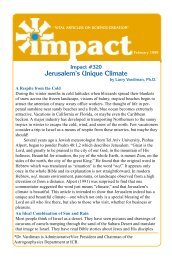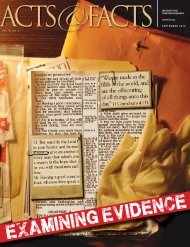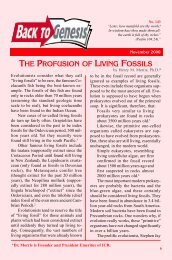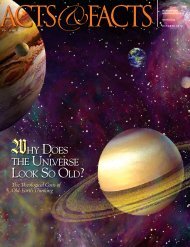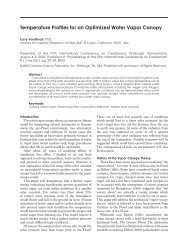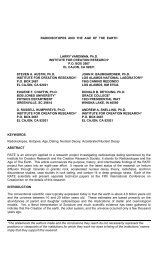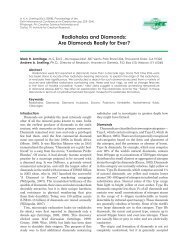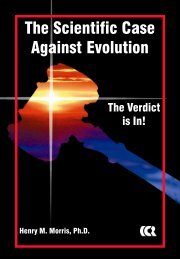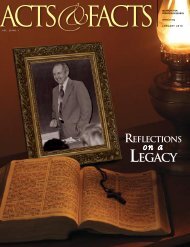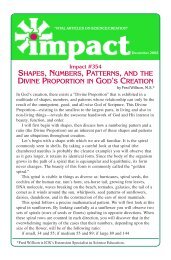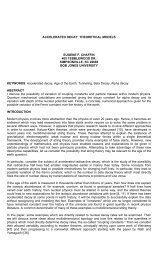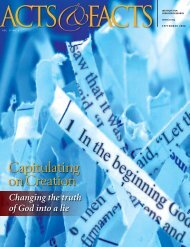Download April 2008 PDF - Institute for Creation Research
Download April 2008 PDF - Institute for Creation Research
Download April 2008 PDF - Institute for Creation Research
You also want an ePaper? Increase the reach of your titles
YUMPU automatically turns print PDFs into web optimized ePapers that Google loves.
a Brilliant Career<br />
Ernst Boris Chain (1906–1979) was<br />
born in Berlin, Germany, where he obtained<br />
his Ph.D. in biochemistry and physiology. Although<br />
he became a highly respected scientist,<br />
as a Jew he <strong>for</strong>esaw what was coming and left<br />
his home country soon after Hitler came to<br />
power. 2 He worked in England as a research<br />
scientist at Cambridge, also studying <strong>for</strong> a<br />
Ph.D. there, and then at Ox<strong>for</strong>d University until<br />
1948. 3<br />
After Ox<strong>for</strong>d, Chain worked in research<br />
and as a professor at several universities. The<br />
promise of better equipment lured him to<br />
Rome, but Britain, conscious of its loss, soon<br />
enticed him back by building him a new research<br />
laboratory. 2 His lifelong work was “all<br />
about the mystery of life,” 4 and during his<br />
40-year career he accomplished “amazingly<br />
diverse achievements” 5 —even feats<br />
once considered impossible, such<br />
as the production of lysergic acid by<br />
the deep fermentation process. 6<br />
a Major Founder of antibiotics<br />
In 1938, Chain stumbled across Alexander<br />
Fleming’s 1929 paper on penicillin in<br />
the British Journal of Experimental Pathology,<br />
which he brought to the attention of his colleague<br />
Florey. 7 During their research, Chain<br />
isolated and purified penicillin. It was largely<br />
this work that earned him his numerous honors<br />
and awards, including a fellow of the Royal<br />
Society and numerous honorary degrees, 8 the<br />
Pasteur Medal, the Paul Ehrlich Centenary<br />
Prize, the Berzelius Medal, and a knighthood. 9<br />
Chain was selected as a co-recipient of<br />
the Nobel Prize specifically <strong>for</strong> his research<br />
that demonstrated the structure of penicillin<br />
and successfully isolated the active substance<br />
by freeze-drying the mold broth to make its<br />
use practical. 10 When Chain was doing his research<br />
it required 125 gallons of broth to produce<br />
enough penicillin powder <strong>for</strong> one tablet!<br />
Now the same tablet is mass-produced <strong>for</strong> a<br />
few cents.<br />
An internationally respected scientist,<br />
Chain is widely regarded as one of the major<br />
founders of the whole field of antibiotics.<br />
Aside from sanitation, the discovery of antibiotics<br />
was arguably the single most important<br />
revolution in medicine in terms of saving lives.<br />
Chain later wrote a leading text on the subject.<br />
11 In 1940 he also discovered penicillinase,<br />
an enzyme that is used by bacteria to inactivate<br />
penicillin, negating its effectiveness. 12 Chain<br />
knew that bacteria had become resistant to the<br />
drug and had already started working on the<br />
problem at this early date.<br />
Other important scientific work by<br />
Chain included the study of snake venom, specifically<br />
the finding that its neurotoxic effects<br />
are caused by destroying an essential intracellular<br />
respiratory coenzyme.<br />
Evolution: a “hypothesis based on no evi-<br />
dence and irreconcilable with the facts.”<br />
a “Hypothesis Based on no evidence”<br />
One of Chain’s lifelong professional<br />
concerns was the validity of Darwin’s theory<br />
of evolution, which he concluded was a “very<br />
feeble attempt” to explain the origin of species<br />
based on assumptions so flimsy, “mainly of<br />
morphological and anatomical nature,” that “it<br />
can hardly be called a theory.” 13<br />
This mechanistic concept of the phenomena<br />
of life in its infinite varieties of<br />
manifestations which purports to ascribe<br />
the origin and development of all living<br />
species, animals, plants and micro-organisms,<br />
to the haphazard blind interplay of<br />
the <strong>for</strong>ces of nature in the pursuance of<br />
one aim only, namely, that <strong>for</strong> the living<br />
systems to survive, is a typical product<br />
of the naive 19th century euphoric attitude<br />
to the potentialities of science which<br />
spread the belief that there were no secrets<br />
of nature which could not be solved<br />
by the scientific approach given only sufficient<br />
time. 14<br />
A major reason why he rejected evolution<br />
was because he concluded that the postulate<br />
that biological development and survival<br />
of the fittest was “entirely a consequence of<br />
chance mutations” was a “hypothesis based<br />
on no evidence and irreconcilable with the<br />
facts.” 15<br />
These classic evolutionary theories are a<br />
gross over simplification of an immensely<br />
complex and intricate mass of facts, and<br />
it amazes me that they were swallowed<br />
so uncritically and readily, and <strong>for</strong> such a<br />
long time, by so many scientists without a<br />
murmur of protest. 15<br />
Chain concluded that he “would rather<br />
believe in fairies than in such wild speculation”<br />
as Darwinism. 13 Chain’s eldest son, Benjamin,<br />
added: “There was no doubt that he did not<br />
like the theory of evolution by natural selection—he<br />
disliked theories…especially<br />
when they assumed the <strong>for</strong>m<br />
of dogma. He also felt that evolution<br />
was not really a part of science, since<br />
it was, <strong>for</strong> the most part, not amenable<br />
to experimentation—and he was, and is,<br />
by no means alone in this view.” 16<br />
Problems with evolution<br />
Another reason he did not consider evolution<br />
a scientific theory was because it is obvious<br />
that “living systems do not survive if they<br />
are not fit to survive.” 15 Chain recognized that<br />
the problem was not the survival of the fittest<br />
but the arrival of the fittest, and that mutations<br />
do produce some variety:<br />
There is no doubt that such variants do<br />
arise in nature and that their emergence<br />
can and does make some limited contribution<br />
towards the evolution of species. The<br />
open question is the quantitative extent<br />
and significance of this contribution. 15<br />
He added that evolution “willfully neglects<br />
the principle of teleological purpose<br />
which stares the biologist in the face wherever<br />
he looks, whether he be engaged in the study<br />
of different organs in one organism, or even<br />
APRIL <strong>2008</strong> • ACTS&FACTS<br />
11



